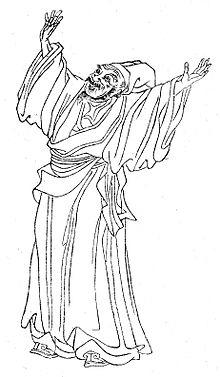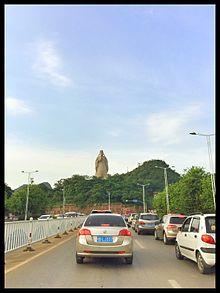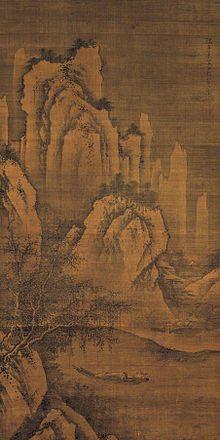Liu Zongyuan | |
|---|---|
 | |
| Born | 773 Yongji, Shanxi |
| Died | 28 November 819 (aged ) |
| Liu Zongyuan | |||||||||||||||||||||||||||
|---|---|---|---|---|---|---|---|---|---|---|---|---|---|---|---|---|---|---|---|---|---|---|---|---|---|---|---|
| Chinese | 柳宗元 | ||||||||||||||||||||||||||
| |||||||||||||||||||||||||||
| Alternative Chinese name | |||||||||||||||||||||||||||
| Chinese | 子厚 | ||||||||||||||||||||||||||
| Literal meaning | (courtesy name) | ||||||||||||||||||||||||||
| |||||||||||||||||||||||||||
Liu Zongyuan (773 – 28 November 819) was a Chinese writer, politician, and poet who lived during the Tang Dynasty. Liu was born in present-day Yongji, Shanxi. Along with Han Yu, he was a founder of the Classical Prose Movement. He has been traditionally classed as one of the "Eight Great Prose Masters of the Tang and Song".
Biography
Early life
Liu Zongyuan was born in 773.[1] His courtesy name was Zihou.
Civil service career
Liu Zongyuan's civil service career was initially successful; but, in 805, he fell out of favour with the imperial government because of his association with a failed reformist movement. He was exiled first to Yongzhou, Hunan, and then to Liuzhou, Guangxi, where he eventually became the city Governor. A park and temple in Liuzhou is dedicated to his memory.[2] His exile allowed his literary career to flourish: he produced poems, fables, reflective travelogues and essays synthesizing elements of Confucianism, Taoism and Buddhism.
Death
He died in 819.[1]
Works
Liu's best-known travel pieces are the Eight Records of Excursions in Yongzhou (永州八游记). Around 180 of his poems are extant, of which five have been collected in the anthology Three Hundred Tang Poems. Some of his works celebrate his freedom from office, while others mourn his banishment.
One of his most famous poems is "Jiangxue" (江雪), sometimes translated into English as "Winter Snow" or "River Snow": this poem has been an inspiration to many works of Chinese painting.
- 江雪
- 千山鳥飛絕
- 萬徑人蹤滅
- 孤舟蓑笠翁
- 獨釣寒江雪
- River Snow
A thousand mountains, no sign of birds in flight;
Ten thousand paths, no trace of human tracks.
In a lone boat, an old man, in rain hat and straw raincoat,
Fishing alone, in the cold river snow.
Liu Zongyuan wrote Fei Guoyu (T: 非國語, S: 非国语, Argument against the Harangues of the Various States), a criticism of Guoyu. In response, Liu Zhang (劉 章, circa 1095–1177); Jiang Duanli (T: 江端禮, S: 江端礼); and Yu Pan (虞 槃 fl. 1300), Yu Ji's (虞 集, 1272–1348) younger brother, wrote texts titled Fei Fei Guoyu T: 非非國語, S: 非非国语; Argument against the Argument against the Harangues of the Various States) in opposition to Liu Zongyuan's essay.[3]
See also
- Classical Chinese poetry
- List of Three Hundred Tang Poems poets
- Tang poetry
References
- ^ a b Ueki et al. 1999, p. 113.
- ^ "Liuzhou Tourism". Archived from the original on September 11, 2014. Retrieved September 11, 2014.
- ^ Nienhauser, William H. Jr. (University of Wisconsin-Madison). A Third Look at "Li Wa Zhuan". T'ang Studies (Print ISSN 0737-5034, Online ISSN 1759-7633), 2007(25), pp. 91–110. Cited p.: 91-92.
Works cited
- Chen, Jo-shui, Liu Tsung-yüan and Intellectual Change in T'ang China, 773–819, Cambridge: Cambridge University Press, 1992. ISBN 0521419646.
- Nienhauser Jr., William H.; Hartmann, Charles; Crawford, William Bruce; Walls, Jan W.; Neighbors, Lloyd, Liu Tsung-yüan, New York: Twayne Publishers Inc., 1973.
- Ueki, Hisayuki; Uno, Naoto; Matsubara, Akira (1999). "Shijin to Shi no Shōgai (Ryū Sōgen)". In Matsuura, Tomohisa (ed.). Kanshi no Jiten 漢詩の事典 (in Japanese). Tokyo: Taishūkan Shoten. pp. 113–115. OCLC 41025662.
External links
- Liu Zongyuan in Wengu textbase, five poems in traditional Chinese arrayed with Bynner's translation.
- Biography and translations of five poems. (Translated by Tony Barnstone and Chou Ping)
- Works by or about Liu Zongyuan at Internet Archive
- Works by Liu Zongyuan at LibriVox (public domain audiobooks)

- Books of the Quan Tangshi that include collected poems of Liu Zongyuan at the Chinese Text Project:

